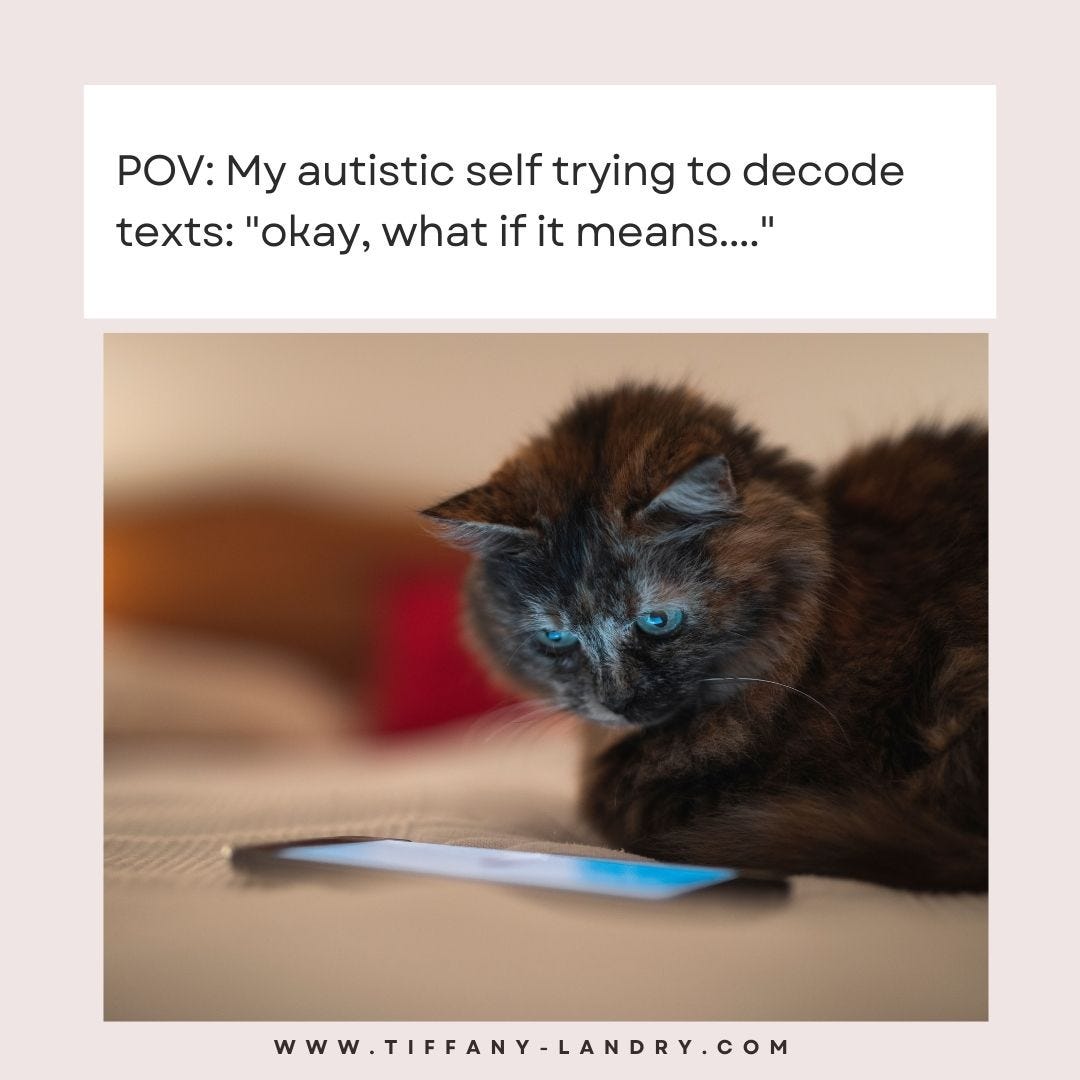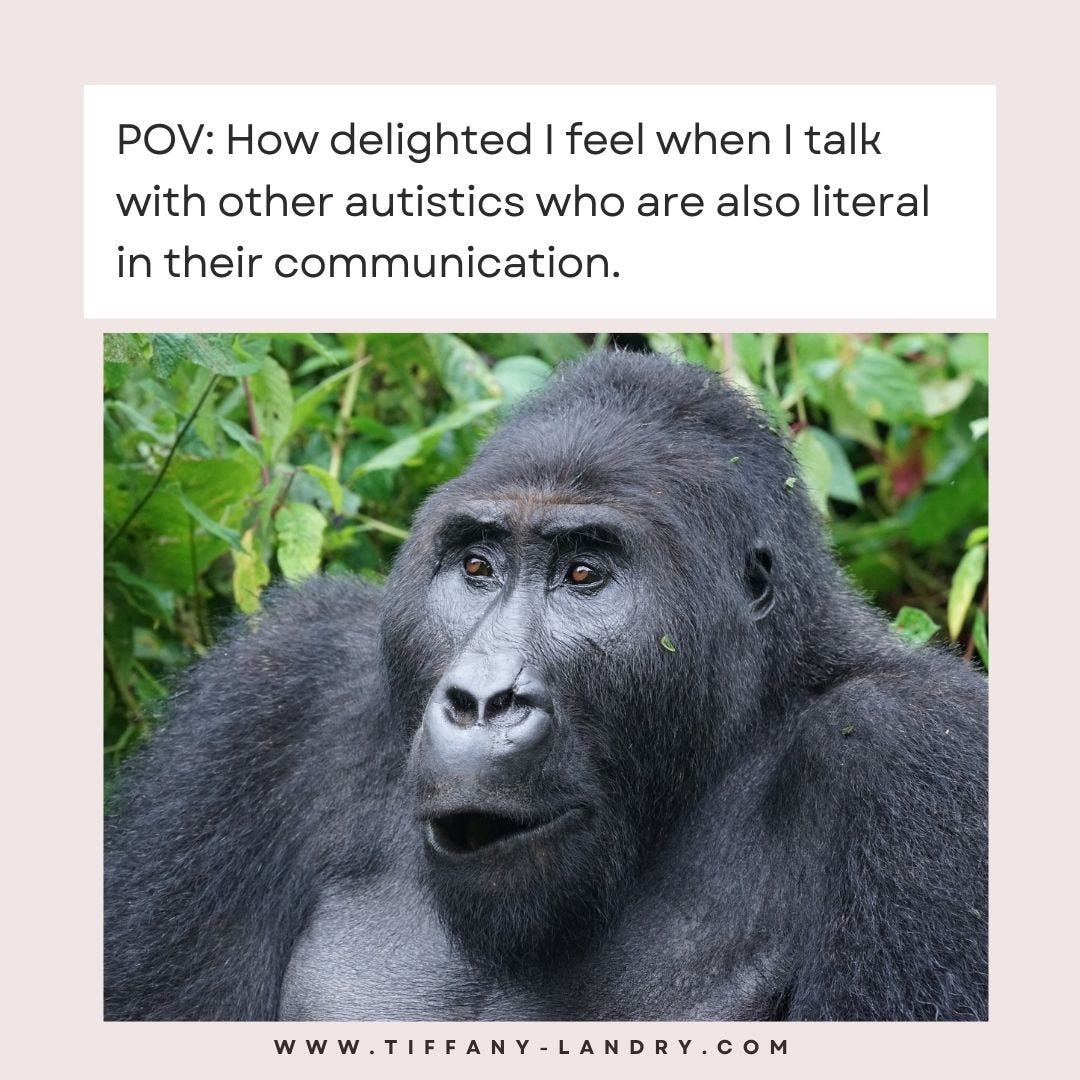Wait, is that sarcasm?
On communication, being autistic and advocating for my autistic needs.
Dear reader, I wrote this piece several weeks ago before the recent horrifying comments about autism made by the U.S. Secretary of Health and Human Services. While I’ve talked about those comments both in Notes and other social media platforms, I’ve decided to publish a piece that I’ve been wanting to publish for a while. This article was been hanging out in my drafts for some time waiting until I got a bit more comfortable before sending it out. While I talk a lot about being autistic on the internet, the topic of advocating for my autistic needs has always felt tender for me.
I want to name that I am an autistic person with low support needs and that there are a wide variety of communication needs that autistics experience. My experience might not reflect your experience and needs-and that’s okay! Like the saying goes “if you’ve met one autistic, you’ve still just met one autistic.” I welcome you to share in the comments your own experience with communication and how you advocate for your needs. If you’re seeking more ideas on advocating for your autistic communication needs, you might enjoy this blog post.
Pre-diagnosis and being so confused.

Before getting my later in life Autism diagnosis I was really used to feeling confused in social interactions, to making guesses at what non literal language meant and getting laughed at when I took something “too” literal or didn’t understand sarcasm. I suspect that’s a reason why my secret comfort show has been The Bing Bang Theory. Not because I enjoy watching harmful representation of Autism combined with sexism and racism. But because I simply felt so seen when Sheldon would ask “was that sarcasm?” or take sarcasm literally. I remember when an ex boyfriend joked about calling me Sheldon because I also didn’t get sarcasm. How I felt shame because of how the character was constantly made fun of. But I wasn’t a genius like Sheldon and as an undiagnosed Autistic I mostly just felt stupid. I felt stupid not only because of my own internalized ableism but also because I’d get laughed at. Laughed at when I took sarcasm literally, ashamed when I’d get into bad situations because I genuinely assumed that people would say what they meant, feeling bad when everyone else seemed to understand things that I simply didn’t.
But then I realized that I was an AuDHDer in my mid 30’s and started to understand that there wasn’t anything wrong with me-as an Autistic person I just had a very literal way of communicating. But I was still so high masking in my communication that I remember people on dating apps respond to me sharing that I’m autistic with a “well you obviously communicate very well!” I feel like there’s a special kind of mind fuck when you realize that you’ve been doing such a good job masking that people think something is easy for you when you really struggle with it. In my case I got used to guessing, googling sayings and pretending like I understood which meant that no one knew how hard I often was working “behind the scenes” of communication. Until one day I realized how exhausted, fed up and deeply annoyed I was at all the spoons I was investing in a way of communicating that felt so illogical to me.
So I stopped. I advocated for my communication needs, I gave myself permission to take things literally and most importantly I validated that my own way of communicating actually made a lot of sense. I started making autistic friends and enjoyed friendships where our language was clear and where we meant exactly what we said. A friend and I would make phone call agendas when we would chat and it felt so soothing and supportive for me. I asked loved ones to use tone indicators in text so I could understand them. But there’s still a tenderness when I get confused and don’t understand what people are saying. It’s still so easy for my nervous system to get activated and to find myself going back to those internalized beliefs of “I’m stupid”, “I’m not good enough” or to simply feel lost.
Acknowledging that I have communication accessibility needs.
It took some time after my diagnosis to identify that I even had communication accessibility needs. The truth is that there are a lot of ways in which I excel at communication: I write a lot of content on the internet, I coach clients one on one and I’m able to verbally speak with both strangers and people I know. Before becoming a coach, I taught ESL to both individual students as well as groups. But the truth is that while I can sometimes understand sarcasm or sayings, I usually find non literal language to be very confusing. I take things literally because that’s just how my brain works1. Understanding sarcasm, jokes and sarcasm is just challenging for me. Like that time I shared with an ex partner that my cat was standing on my breasts (as cats tend to do) and he said “Wow, I’m jealous of your cat.” Which made me confused and then concerned that this new person I was dating somehow wanted to stand on my breasts! Some other communication things I do that are common for some Autistics are not being aware of my volume, being straight forward but coming across as rude, my face not always matching my emotions and being able to understand better when I don’t have to provide eye contact.
When I first identified that I had specific communication needs it felt tender and scary to even admit. At first it felt validating to name the areas where I struggled but it also felt supportive to reframe “being bad at communicating” to “having different communication needs.” The truth is that I’m not bad at communicating, I just communicate differently. While I initially worried that my coaching career would suffer if people knew that I had specific communication needs, it hasn’t been an issue since I tend to work with Autistics and AuDHDers in my private coaching practice. I’m still exploring how to get my social needs met in an autistic supportive way while also honoring my communication needs. Right now all of my friends are Autistic or AuDHDers and there’s a general ease with communication. But sometimes it’s hard when I’m trying so hard to understand someone or a concept and it feels like my brain just can’t. When that happens I can advocate for my communicate needs as well as surround myself with autistic affirming support and care.
Sometimes being Autistic is hard and that’s okay.
I’m so grateful for my knowing that I’m AuDHDer and my relationship to being Autistic has changed over the years. This August I’ll be celebrating my 4 year Autism Diagnosis Anniversary (yes, there will 100% be cake!) and feeling at home in my Autistic self continues to be a beautiful journey. There is so much beauty, joy and pleasure in being Autistic. But it’s also a disability and there are ways in which life can feel challenging and disabling. While my life has gotten so much better since I moved to the rural countryside, it’s still sometimes hard. Sometimes I still get frustrated when I can’t understand someone, get sensory overloaded because of the background noises when I do errands in the nearby city or feel the warning signs of a shutdown or meltdown. I spend a lot of my time in neurodivergent affirming spaces and it can feel like a shock to my system when I’m in spaces that aren’t neurodivergent affirming and accessible. But when days feel hard that’s when I’m so grateful for my small group of Autistic and AuDHDer friends who get it. Who check in on you after a meltdown or send you memes of your special interest (penguin pebbling for the win!) Where you can chat about dating and ask “hey, what’s the social protocol for this?” and you both laugh because you have absolutely no idea. Surrounding myself in autistic centered spaces and having autistic friends has been so incredibly healing and supportive.
What I’ve been reading:
I’m still reflecting on this fantastic essay by Dr. Anna Megan Neff called Neurodivergent Identity Arcs.
Unmasking for Life by Devon Price. I’m still in the introduction of this one but I’m already finding so many wonderful gems.
MeowStack is honestly one of my favorite Substack. Imagine a newsletter with photos of cute cats who answer questions like “why are you the most magnificent creature in the universe?” and “By what means will you inevitably achieve world domination?” If you love cats, I highly recommend this newsletter!
Seeking neurodivergent affirming support?
I’m enrolling clients in my 5 month program The Somatic Mentorship. This is a private coaching program that’s a combination of neurodivergent affirming somatic trauma resolution, neurodivergent education and steady support. You can learn more here.
For late identified autistics I’m excited to offer Autistic Support Sessions which is a coaching package of three coaching sessions spread out over 1-2 months. Perfect if you’re desiring attuned support, practical tips and neurodivergent education. You can learn more here.
When I talk with people who are interested in one of my coaching programs I always like to remind them: you deserve the best support. You should be picky about who you choose as a coach or practitioner. This is why I offer free 60 minute no pressure Feeler Calls so we can both feel into if working together would be a good fit for both of us.
The above offers have sliding fee scales to make this work for accessible.
Thank you for being here.
I appreciate you being here and reading my words. If something in this piece resonated with you, please feel free to share a comment or to “like” it. I hope your Sunday is filled with slowness, yummy food and things that feel nourishing and joyful to you.
Sending care,
Tiffany
When we talk about autistics being literal this is actually an aspect of rigidity. In “Is This Autism?” the authors share that “being literal is included in this category because it involves difficulty using context to flexibly, and thus accurately, interpret language”- Is This Autism: A Guide for Clinicians and Everyone Else by Donna Henderson and Sarah Wayland, with Jamell White (pg. 124.)





Wait, was that a joke? After I instinctively answered seriously. Closely followed by, I don't see why it's funny?
I’m a 23 yo autistic, diagnosed last year. I’m still a long while from figuring myself out. I’ve also always struggled with taking things literally, not understanding ‘turns of phrase’, sarcasm, or why someone wouldn’t say exactly what they mean. I found out this is an autism-related thing. It always makes me feel better to think hey, at least I’m not the only one! This article made me feel that way too.
I didn’t realize this was something people COULD accommodate for me, until my current partner. One day he told me that he purposely doesn’t use sarcasm as a joke and tries to talk very literal with me. That was the first time anyone has cared about my communication needs.